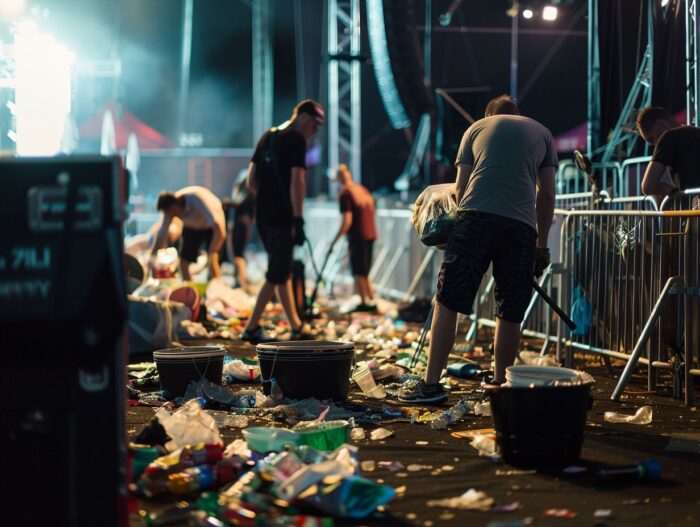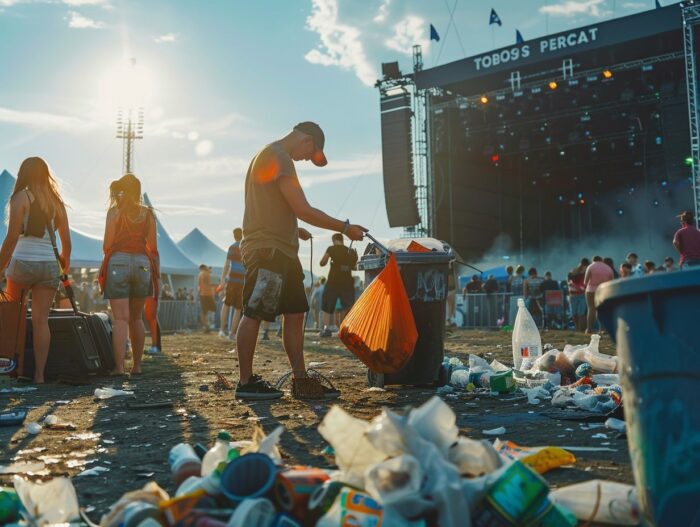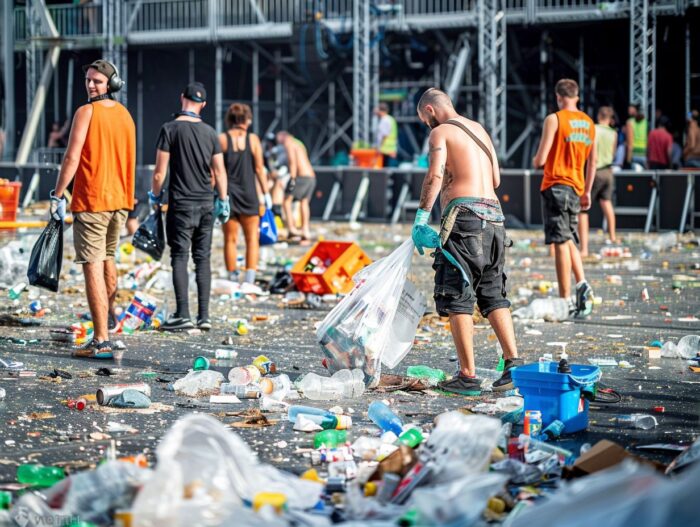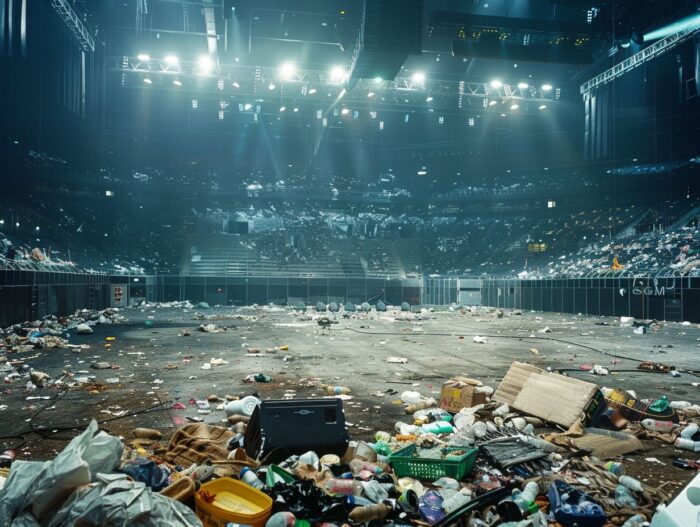Have you ever wondered what happens to all the waste generated after a big concert? From plastic cups to food wrappers, the aftermath of such events can create a massive clean-up challenge.
Today, we lift the curtain on live events waste disposal. We will discuss the environmental impacts of poor rubbish removal and highlight some successful examples of post-concert clean-up efforts.
What are the Challenges of Rubbish Removal After Big Concerts?
Managing waste removal after large concerts presents challenges requiring efficient waste management strategies. From handling diverse types of waste to navigating strict waste disposal regulations, the clean-up process after l can be complex.
The sheer volume of waste generated at these events adds another layer of complexity, overwhelming traditional waste disposal systems. Time constraints also play a significant role, as quick removal is essential to avoid creating eyesores or health hazards.
The need for proper waste segregation to ensure recyclables are diverted from the rubbish tip further complicates the clean-up efforts. These challenges impact waste removal logistics and pose potential environmental and public health risks if not managed effectively.
Large Volume of Waste
One of the primary challenges of rubbish removal after big concerts is managing the significant volume of waste generated during the event. The sheer amount of litter, debris, and discarded items necessitates efficient waste handling and disposal methods.
To address this issue, waste segregation becomes crucial, as different types of waste must be sorted for appropriate disposal. Without proper segregation, recycling efforts are hindered, leading to more waste in landfills.
This is where specialised waste disposal equipment, such as compactors and shredders, come into play to efficiently handle the diverse waste materials. Waste collection services are vital in coordinating the collection, transportation, and disposal of substantial quantities of waste produced at concerts, ensuring environmental sustainability and public health safety.
Limited Time for Clean-up
Another significant waste removal challenge after big concerts is the restricted timeframe for clean-up operations. The quick turnover between the end of the concert and the venue reopening requires meticulous planning and swift execution of waste removal tasks.
During this post-concert rush, every minute counts to ensure the venue is clean and ready for the next event. Coordinating teams, equipment, and waste disposal services efficiently becomes crucial to meet the tight schedule. Waste handling procedures must be streamlined, with designated areas for different types of waste to enable quick sorting and disposal. Organisational skills are paramount as teams must work seamlessly together to clear the site swiftly and effectively, using rapid waste disposal methods to keep up with the demanding time constraints.
Different Types of Waste
The diverse range of waste materials produced after big concerts poses a challenge for rubbish removal teams. From food waste to plastic bottles and concert merchandise, effectively sorting and disposing of different waste types is essential for sustainable waste management.
Concert venues often see a mix of organic waste, such as leftover food, paper napkins, biodegradable materials, and recyclables like cans, bottles, and cardboard. Hazardous materials like batteries, chemicals, and broken glass further complicate the waste disposal process.
To address this complex scenario, waste sorting and recycling initiatives are crucial in diverting materials from landfills and promoting environmental responsibility.
Potential Hazards
Addressing potential hazards during rubbish removal after big concerts is crucial to ensuring the safety of clean-up crews and the public. Hazardous materials, broken glass, and sharp objects present risks that must be managed effectively during waste disposal.
Proper waste disposal procedures are essential to safeguard against contamination, injury, and environmental harm. Clean-up crews must wear protective gear such as gloves, safety glasses, and sturdy footwear to reduce the risk of exposure to harmful substances.
By proactively identifying hazards like chemical spills or biohazards, clean-up operations can be conducted with greater caution and efficiency. Following strict guidelines for waste segregation and disposal helps minimise the potential impact on the environment and public health.
How Can These Challenges be Addressed?
Implementing effective waste management solutions is key to tackling the challenges of rubbish removal after big concerts. Proper planning, coordination, and the use of specialised equipment can streamline post-concert clean-up operations and enhance waste disposal efficiency.
By establishing clear waste-handling procedures and educating staff members on proper disposal methods, organisers can ensure a systematic approach to managing concert waste. Utilising eco-friendly waste disposal equipment, such as recycling bins and composting facilities, helps to minimise the environmental impact of large-scale events. Engaging professional waste management services for specialised waste removal tasks can significantly benefit in meeting waste disposal goals efficiently. Integrating these strategies into the event planning process is crucial to addressing post-concert rubbish removal challenges effectively.
Proper Planning and Coordination
Effective rubbish removal after big concerts necessitates thorough planning and seamless coordination among clean-up crews, waste management companies, and event organisers. Establishing clear protocols, timelines, and communication channels is essential for successful waste management.
By ensuring tasks are clearly defined and distributed according to the strengths and capabilities of each team member, the clean-up process can be streamlined and optimised.
Proper resource allocation, such as strategically providing sufficient waste bins and recycling stations throughout the venue, is crucial in facilitating the efficient collection of rubbish.
Effective communication strategies, including regular updates on progress and potential issues, help all parties stay informed and work towards a common goal of maintaining a clean and safe environment post-concert.
Use of Specialised Equipment
Employing specialised waste disposal equipment is instrumental in addressing the challenges of rubbish removal after big concerts. Waste compactors, shredders, and sorting machines can enhance waste handling efficiency and streamline clean-up.
These machines are crucial in managing the large volumes of waste generated at concert venues. Waste compactors, for instance, compress rubbish into smaller, more manageable sizes, reducing the need for frequent waste collection trips. Shredders break down bulky items into smaller pieces, facilitating easier disposal. Sorting machines help segregate recyclable materials from general waste, promoting sustainable waste management practices. Incorporating advanced technology in waste disposal expedites the cleaning process and minimises environmental impact by promoting recycling and proper waste disposal.
Hiring Professional Waste Management Services
Engaging professional waste management services for post-concert rubbish removal can streamline the clean-up process and ensure compliance with waste disposal regulations. Experienced waste removal companies possess the expertise and resources to manage concert waste efficiently.
By entrusting the clean-up operation to professionals, event organisers can save valuable time and resources, allowing them to focus on other aspects of the event. These waste management services not only handle the physical removal of waste but also ensure that all waste is sorted, recycled, or disposed of in accordance with environmental guidelines. Partnering with waste removal companies can significantly reduce the ecological impact of post-concert waste, promoting sustainability and responsible waste management practices.
What are the Environmental Impacts of Poor Rubbish Removal?
Inadequate rubbish removal post-concert can have severe environmental consequences, leading to pollution of land and water sources, harming wildlife, and negatively impacting local communities. Poor waste management practices exacerbate sanitation issues and litter control challenges.
The accumulation of discarded materials after significant events can contribute to greenhouse gas emissions and soil contamination. It can result in long-term damage to ecosystems and the disruption of natural habitats, affecting the delicate balance of biodiversity.
Addressing these challenges requires a holistic approach that includes waste segregation, recycling initiatives, and sustainable waste disposal methods. By prioritising proper waste management, communities can reduce their ecological footprint and foster a cleaner, healthier environment for humans and wildlife.
Pollution of Land and Water Sources
Poor waste removal practices after a concert contribute to the pollution of land and water sources, contaminating ecosystems and endangering aquatic life. Improper waste disposal can result in soil degradation, water contamination, and ecological harm.
Such pollution impacts the physical environment and disrupts the delicate balance of ecosystems, affecting biodiversity. Toxic materials from improperly disposed waste can seep into soils and water bodies, leading to long-term plant and animal life damage. In aquatic environments, pollutants can bioaccumulate in marine organisms, eventually entering the food chain and posing risks to human health.
Adopting sustainable waste management practices, such as recycling, composting, and responsible disposal, is crucial to mitigate these environmental risks and safeguard our planet’s natural resources for future generations.
Harm to Wildlife
Inadequate waste removal after the concert threatens wildlife through litter ingestion, habitat destruction, and pollution-related health issues. Improper waste management practices can harm local fauna and disrupt ecological balance.
Negative Impact on Local Communities
The repercussions of inadequate rubbish removal extend to local communities, affecting public health, aesthetics, and community well-being. Accumulating waste post-concert can lead to unsanitary conditions, pest infestations, and decreased quality of life for residents.
Such conditions not only pose immediate health risks but also have long-term implications on the community’s overall well-being. In addition to the physical health impacts, unmanaged waste can contribute to environmental pollution and degradation. Without proper waste management policies and community engagement, the neighbourhood’s social fabric can be strained, leading to increased tensions and compromised living standards for residents.
Thus, addressing waste management issues is crucial for maintaining a clean, safe, and harmonious local environment.
What are Some Successful Examples of Rubbish Removal After Big Concerts?
Several prominent music festivals have set commendable examples of effective rubbish removal post-concert, showcasing successful waste management practices. Events like the Glastonbury Festival, Coachella Music Festival, and Lollapalooza Music Festival have demonstrated excellence in concert waste disposal.
For instance, at Glastonbury Festival, recycling stations are strategically placed across the grounds, encouraging attendees to separate their waste into appropriate recycling, composting, or landfill bins. The festival organisers prioritise working with local waste management companies and volunteers to ensure the site is clean and litter-free after the event.
Similarly, the Coachella Music Festival implements a ‘Leave No Trace’ policy, urging festival-goers to take their rubbish with them and minimise environmental impact. These initiatives enhance the festival experience and contribute to a more sustainable and eco-friendly environment.
Glastonbury Festival
Glastonbury Festival is a prime example of effective rubbish removal and event waste handling practices. The festival’s waste segregation initiatives, recycling programmes, and dedicated clean-up crew contribute to its successful concert waste management.
By implementing a comprehensive waste management system, Glastonbury Festival prioritises environmental sustainability and cleanliness throughout the event grounds.
Waste segregation bins are strategically placed, encouraging attendees to separate their waste into recyclables, compostables, and general waste categories. The recycling programmes ensure that materials like plastic, glass, and paper are diverted from landfills and given a second life through proper recycling.
The dedicated clean-up crew diligently works to maintain a clean environment, collecting and sorting waste to minimise the festival’s ecological footprint and promote a culture of responsible waste disposal.
Coachella Music Festival
Coachella Music Festival sets a notable precedent in concert waste management through its comprehensive waste recycling programmes. The festival’s emphasis on waste reduction, recycling initiatives, and venue maintenance showcases its commitment to sustainable event clean-up.
This commitment to environmental sustainability is reflected in various aspects of the festival, from compostable packaging and reusable tableware to strategically placed waste sorting stations throughout the grounds. By encouraging attendees to separate their waste into designated recycling, composting, and landfill bins, Coachella effectively diverts a significant amount of waste from ending up in landfills. The festival organisers have also partnered with local recycling facilities and waste management companies to ensure the collected materials are correctly sorted, processed, and repurposed, reducing the event’s ecological impact.
Lollapalooza Music Festival
Lollapalooza Music Festival exemplifies effective waste disposal methods and concert venue clean-up operations. The festival’s waste segregation practices, clean-up crew management, and sustainability efforts contribute to its successful rubbish removal post-concert.
- Attendees are encouraged to participate in the waste segregation by using designated bins for recyclables, compostables, and general waste.
- This proactive approach helps reduce the festival’s environmental impact by diverting materials from landfills.
- The clean-up crew efficiently sorts through the different waste streams, ensuring that materials are disposed of properly.
Lollapalooza’s commitment to sustainability extends beyond the festival grounds. Partnerships exist to recycle and repurpose materials used during the event. These initiatives contribute to maintaining cleanliness and promoting environmental responsibility among concert-goers.



